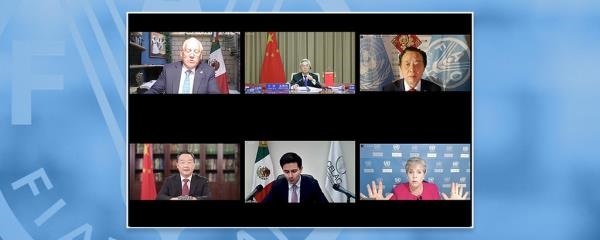
25 February 2021, Mexico City/Beijing/Rome - The Director-General of the Food and Agriculture Organization of the United Nations (FAO), QU Dongyu, today addressed the 2nd China-CELAC (Community of Latin American and Caribbean States) Forum on Agriculture, where he stressed the importance of strong partnerships to overcome the impacts of the COVID-19 pandemic and announced a project to boost the use of digital technologies in the region.
The second China-CELAC Forum was held under the joint chairmanship of the Secretary of Agriculture and Rural Development of Mexico, Victor Villalobos, and the Minister of Agriculture and Rural Affairs of China, TANG Renjian. Twenty-six Latin American and Caribbean countries were represented by their ministers or vice ministers.
In his remarks, Director-General Qu noted that the COVID 19-pandemic has aggravated the growing inequalities in Latin America and the Caribbean, and the region runs the risk of a 20-year setback in the fight against hunger.
He praised CELAC for seeking cooperation with other regions to face this challenge, and China for its firm commitment to cooperate for economic growth focused on shared prosperity, protecting the environment and the principles of the 2030 Agenda for Sustainable Development.
Through the COVID-19 Response and Recovery Programme, FAO has supported the efforts of CELAC to overcome the impact of the crisis, initially by providing an impact analysis to determine the effective regulatory instruments regarding the sustainability of food systems and food security. This measure has benefited several countries, such as Belize, Bolivia Colombia, Ecuador, El Salvador, Guatemala, Honduras, Nicaragua, Paraguay, Peru, Venezuela and small island states of the Organisation of Eastern Caribbean States (OECS).
During the meeting, the Director-General announced that, with the CELAC Pro Tempore Presidency of Mexico, FAO is in the final phase of approving an ambitious regional programme to support the recovery of agri-food systems in 12 countries of the region, with support from the FAO-China Fund for South-South Cooperation.
"The project will promote knowledge sharing and development exchanges, based on China's advanced experience in the field of digital agriculture," he said.
"In addition, this project will support the design and set-up of the CELAC-China-FAO Digital Agriculture and Rural Development Facility in FAO's Regional Office for Latin America and the Caribbean, to establish the technical and knowledge foundation for the promotion of digital solutions in the region."
All these efforts are part of FAO's broader objective aimed at supporting its Members to transform agri-food systems in order to provide food security and better nutrition for all, making them efficient, economically sustainable and inclusive, with a positive effect on the climate and the environment.
"Building green and inclusive agri-food systems is one of the most powerful ways to recover from the current crisis by Better Production, Better Nutrition, Better Environment and a Better Life," the Director-General said.
He also highlighted the potential of CELAC countries as food producers (13 percent of the world's food) and exporters (45 percent of global net food exports), and noted that trade can boost farmers' productivity and income, encouraging their participation in markets and value chains, and contributing to greater efficiency in the use of natural resources.
"Data show us that, in low-income countries, investment in agriculture - especially family and small-scale farming - has a greater impact on poverty reduction than investment in other sectors," Qu said.
The Director-General noted that the recent FAO Regional Conference for Latin America and the Caribbean, held in October 2020, had agreed to prioritize four highly relevant areas: innovation, international and interregional trade, strengthening partnerships with the private sector, and adaptation to climate change.
In this context, he stated that innovation is not just about new technologies, but also about financing, networking and new business models to accelerate the transformation process, highlighting the key role of private investors.
"We have recently approved a modern FAO Strategy for Engagement with the Private Sector, which enables us to enhance our strategic partnerships for jointly achieving the Sustainable Development Goals."
The Director-General also alluded to FAO's Hand-in-Hand Initiative and its tools, whose multi-sectoral and partnership-focused approach aims to reduce poverty by enhancing agricultural potential, as well as investing in innovative, inclusive and productive value chains and creating human capital.
In inaugurating the meeting, Secretary Victor Villalobos called for the cooperation between Latin America and the Caribbean and China to expand agrifood trade "under the principle of economic complementarity." He proposed increasing scientific and technological collaboration through agricultural research institutes. Villalobos also said that "FAO is a fundamental ally of Mexico and of the CELAC countries."
Minister Tang reminded participants that the relations between the region and China had grown in many dimensions since the first Ministerial Forum that took place in Beijing in 2013. He proposed to boost collaboration in three areas: (1) aligning development strategies through policy dialogue for better cooperation that would boost agricultural modernization and increase the wellbeing of rural residents; (2) Stepping up scientific and technological cooperation to enhance high quality agricultural development; (3) expanding agrifood trade and investments, with the goal of trading $ 100 billion in 2030, as well as $5 billion in Chinese investment in the Latin American and Caribbean agriculture.
Alicia Barcena, Executive Secretary of the UN Economic Commission for Latin America and the Caribbean (ECLAC), highlighted the exemplary collaboration with FAO in COVID-19 response and recovery efforts. She proposed to emphasize three areas for cooperation between the Latin America and Caribbean region and China: (1) digitalization in agriculture; (2) social and economic inclusion of smallholder family farmers, and (3) a science-based agroecological transition.